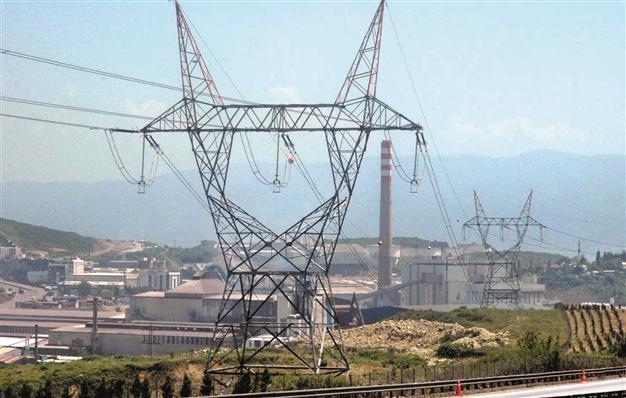Greek Cyprus hits North with $1.3 billion bill
Ömer Bilge NICOSIA/Hürriyet

The Turkish Cypriot government has a debt of $1.3 billion for using the Greek side’s power for years, says the Electricity Authority of Greek Cyprus. DAILY NEWS photo, Hasan ALTINIŞIK
Greek Cyprus says the government of Northern Cyprus should pay the 1 billion euro ($1.3 billion) electricity debt it has built up, refuting Turkish Cypriot claims of rights over the island’s gold and energy sources that the Greek Cypriot government is planning to sell in order to tackle its financial crisis.Turks have paid no electricity bills since the separation of Turkish Cypriots from the Cypriot Republic government in 1963, Electricity Authority of Cyprus (AIK) Manager Hristos Tufeksis told Greek media, amid the ongoing dispute between the two sides of the island over gold reserves and off-shore energy resources that Greek Cyprus is looking to sell in order to recover from the EU bailout.
The Turkish Cypriot government is in the debt of the Greek side by 1.018 billion euros, as the 269 million-euro debt capital has risen with the addition of interest rates and hikes between 1963 and 2012, according to data provided by a Greek official.
“Turks prevented the invoicing of [electricity] counters by blocking them in 1963. In 1974, when the Turkish army came to the island, we continued providing electricity since there were Greeks living in the Karpaz region. We’re still providing electricity to the Pile, Beyarmudu and Akıncılar villages [of Northern Cyprus], controlled by the United Nations,” Tufeksis said.
From 1974, the date of the “Cyprus Peace Operation,” until the foundation of the Turkish Republic of Northern Cyprus in 1983, the Greek section gave unlimited free electricity as requested by politicians, he added.
‘Turkey should pay’
Tufeksis called on Turkey to pay the bill as the Greek government doesn’t recognize the Turkish Republic of Northern Cyprus as a legitimate country. “A way to procure the debt from the northern government without recognizing it should be found, or the bill should be sent to Turkey to ask for the money,” he said.
Tufeksis added that the bill could be put on the table during possible negotiations between two sides over the oil and gas exploration rights around the Mediterranean island.
Greek Cyprus has offshore exploration deals with major oil and gas producers including French company Total, Israeli oil firms Delek and Anver and Italian Eni, with which Turkey recently suspended relations due its insistence on working on Cypriot shores.
In addition to the ongoing dispute over oil and gas resources, relations between the two governments on the island cooled after the Greek Cypriot government agreed to sell 400 million euros worth of its gold reserves, which the Turkish side claims rights to.
Turkish Cypriot leader Derviş Eroğlu’s office issued a statement claiming the gold belongs to both the Turkish and Greek communities, and thus cannot be sold without Turkish Cypriot consent, the Cyprus Mail reported last week. “The Republic of Cyprus was established in 1960 as a common state between Greek and Turkish Cypriots, and that also relates to all its resources, including the gold belonging to both communities on the island,” the statement read.
Greek Cyprus’ agreement to sell its gold reserves was one of several shockwaves sent through European financial markets during its progress toward a bailout earlier this month.
Greek Cypriot Finance Minister Harris Georgiades said in an interview that the southern government was not giving priority to a sale of gold reserves under the international bailout agreed this month and is still exploring all options to meet its side of the deal, Reuters reported. Georgiades also said he anticipated that currency controls would be eased in “days or weeks.”
















